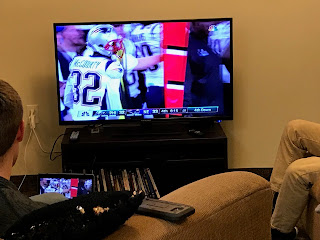Book Club
Hello to all my avid followers. Today, I wanted to talk a little about a book I read called Oddly Normal. Its about John Schwartz's son Joe and Joe's coming to terms with his own sexuality and mental illness but told from the point of view of the parents. It was a really good read and I thought I would share some thoughts I had from the book. Also, spoilers. So...watch out.
1. I had a few places where I felt a little uneasy. The first kind of idea was how casual Joe's parents were with his struggle. Several times throughout the book, the parents discussed Joe's sexuality with other people before Joe even came out. I was a little put off by the fact that they felt that it wasn't a big deal when it clearly was. Joe at one point said that his "secret" (his sexuality) was so big that if he told his therapist, he'd have to kill her. Yet his parents talked about his sexuality with his teachers, administrators and friends of the family. I also felt disrupted with the fact that the parents called their network of gay friends to whom they turned for support their "network of gay uncles." I feel like this reduced the friends down to just one aspect of their identity. Another disruption came from how adamant the parents were that Joe not be labelled on the autism spectrum. It seemed like that was the worst thing that could happen to him and they refused to believe that he was autistic. Finally, I felt a big disruption with a lot of the teachers and administrators. It felt like many of them purposefully went out of their way to make life difficult for Joe and his parents. I almost couldn't believe what they were doing to cause problems!
2. The plot line of Joe's parents trying to figure out what was going in with him academically/mentally seemed to exemplify some of the stigma against disability we talked about. Many of the teachers talked about Joe being "classified" as disabled as if it were the worst thing that could happen. And because of that, Joe went for a long time not getting the help or accommodations that he needed because of the stigma against it. There was also a section that discussed Joe and his family trying to find resources for him and discovering a queer center in New York. Once they found this, things really turned around for Joe's acceptance of himself as well as his mental health. I think this really exemplified the importance of queer-safe places in our our schools. His middle school didn't even have a GSA (which apparently is not uncommon) and that really took a toll on Joe. However, when he was around other queer individuals and supportive allies, things got a lot better.
3. I feel like this gave me a really different perspective on how to interact with parents as a teacher. I think all prospective and new teachers kind of fear the over-concerned or over-involved parents and I think Joe's parents were definitely some of them. However, it was really interesting to see from the parents' perspective whey that was. The teachers in the book, especially the really experienced teachers, thought they knew how to deal with everything and didn't want to listen to the parents. However, we, as teachers, don't know everything that is going on outside the classroom but the parents do. If we don't listen as they try to give us advice and important information they are getting from mental health professionals. I think it is important to use our experience dealing with kids. However, when parents come in with real concerns, we need to listen and I really think Oddly Normal really drove that point home for me.
4. I think a big idea from the book is that coming out is such an individualized thing. Just because Joe's parents were so accepting and they knew that Joe was gay did not mean that it was easy for him to come out or that he didn't need to come out. I think that one of the themes of the book is that someone's sexuality is such a personal thing and problems can come up if people aren't accepted for who they are or if they are outed against their will. (Much of the book was interspersed with research about mental health research done with LGBTQ+ youth.) I think another idea from the book that is really important is that school is such a formative place for people and teachers are a big part of that. If we don't create a welcoming, accepting and nurturing place for all our students, things will go sour.
1. I had a few places where I felt a little uneasy. The first kind of idea was how casual Joe's parents were with his struggle. Several times throughout the book, the parents discussed Joe's sexuality with other people before Joe even came out. I was a little put off by the fact that they felt that it wasn't a big deal when it clearly was. Joe at one point said that his "secret" (his sexuality) was so big that if he told his therapist, he'd have to kill her. Yet his parents talked about his sexuality with his teachers, administrators and friends of the family. I also felt disrupted with the fact that the parents called their network of gay friends to whom they turned for support their "network of gay uncles." I feel like this reduced the friends down to just one aspect of their identity. Another disruption came from how adamant the parents were that Joe not be labelled on the autism spectrum. It seemed like that was the worst thing that could happen to him and they refused to believe that he was autistic. Finally, I felt a big disruption with a lot of the teachers and administrators. It felt like many of them purposefully went out of their way to make life difficult for Joe and his parents. I almost couldn't believe what they were doing to cause problems!
2. The plot line of Joe's parents trying to figure out what was going in with him academically/mentally seemed to exemplify some of the stigma against disability we talked about. Many of the teachers talked about Joe being "classified" as disabled as if it were the worst thing that could happen. And because of that, Joe went for a long time not getting the help or accommodations that he needed because of the stigma against it. There was also a section that discussed Joe and his family trying to find resources for him and discovering a queer center in New York. Once they found this, things really turned around for Joe's acceptance of himself as well as his mental health. I think this really exemplified the importance of queer-safe places in our our schools. His middle school didn't even have a GSA (which apparently is not uncommon) and that really took a toll on Joe. However, when he was around other queer individuals and supportive allies, things got a lot better.
3. I feel like this gave me a really different perspective on how to interact with parents as a teacher. I think all prospective and new teachers kind of fear the over-concerned or over-involved parents and I think Joe's parents were definitely some of them. However, it was really interesting to see from the parents' perspective whey that was. The teachers in the book, especially the really experienced teachers, thought they knew how to deal with everything and didn't want to listen to the parents. However, we, as teachers, don't know everything that is going on outside the classroom but the parents do. If we don't listen as they try to give us advice and important information they are getting from mental health professionals. I think it is important to use our experience dealing with kids. However, when parents come in with real concerns, we need to listen and I really think Oddly Normal really drove that point home for me.
4. I think a big idea from the book is that coming out is such an individualized thing. Just because Joe's parents were so accepting and they knew that Joe was gay did not mean that it was easy for him to come out or that he didn't need to come out. I think that one of the themes of the book is that someone's sexuality is such a personal thing and problems can come up if people aren't accepted for who they are or if they are outed against their will. (Much of the book was interspersed with research about mental health research done with LGBTQ+ youth.) I think another idea from the book that is really important is that school is such a formative place for people and teachers are a big part of that. If we don't create a welcoming, accepting and nurturing place for all our students, things will go sour.


Comments
Post a Comment